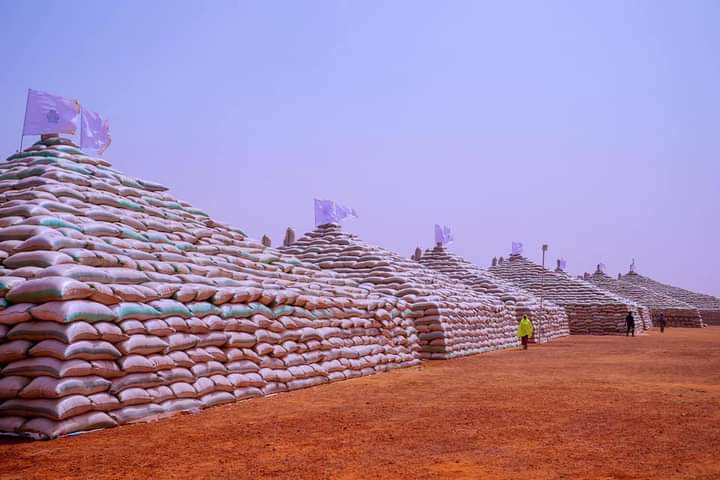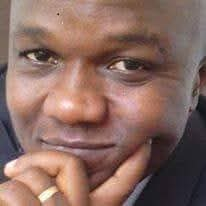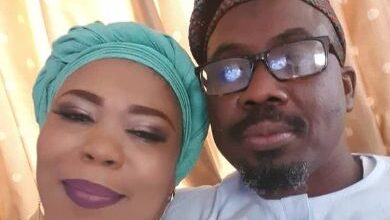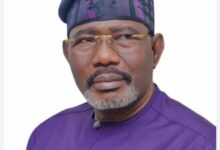BUHARI ADMINISTRATION AT 6: EVEN THE BLIND CAN SEE CERTAIN THINGS, BY FEMI ADESINA

This day six years ago, Muhammadu Buhari was inaugurated into office as President. One can vividly recall the spectacle as he stood ramrod straight on the dais at Eagle Square, taking the oath of allegiance to Nigeria, and promising to belong to everybody, and to nobody.
Well, as they say, a lot of waters have passed under the bridge since then. Nigeria has seen a lot of good. Lots and lots of it. The country has equally seen the bad. Lots and lots of it. Seen the ugly too. Lots and lots of it. That’s the way life often goes. A mixed bag. Like being out there on the sea, calm and serene at times, tempestuous and rambunctious at other times.
As the Buhari administration clocks six, revisionists will want to paint just a picture of woes, thoroughfare of woes. But reality says no. In the words of former British Prime Minister, Sir Winston Churchill, “Truth is incontrovertible. Ignorance may deride it, panic may resent it, malice may destroy it, but there it is.”
No doubt, Nigeria faces a lot of challenges, particularly in the areas of security and the economy. And it has affected the quality of lives of the people. Will we pull back? Yes, we are pulling back already, and our country is being retrieved. Soon, we will arrive Canaan, flowing with milk and honey.
President Buhari inherited a land that was badly riven, a boat filled with holes, and taking in water massively. He struggled, and stabilized the craft. Things got better, as the battle was taken to the enemies of the country. Then, suddenly, it got worse again. If insurgency was the main problem, banditry joined. Kidnapping for ransom threw its hat into the ring. Murders, mayhem, cult killings, violent criminalities, all joined, till it began to seem that nothing else was happening in the land, except killings, and more killings. True? False.
Despite the overwhelming nature of security challenges, the Muhammadu Buhari administration is taking some giant strides that make one believe that happier days lay ahead of the country. But that is for those who choose to see the bright, and not perpetually gloomy side of things.
A Fact Sheet has been released by the media office of the President, chronicling some of the achievements of the government in the past six years. And it is still work in progress, with two more years to go.
Before it breasts the tape, the Administration will lay the security challenges to rest. Peace and calm will return to this country, from north to south, east to west. And what will easily pedestal this government among the greats (in fact, greatest) are strides in infrastructure. The deficits in infrastructure would have been significantly reversed, and such is evident even now.
Join me on a voyage of discovery, and we’ll have things to see. The blind would see it, and the deaf would hear. Come on, let’s go.
*Some achievements in the area of rail development:
– 156km Lagos-Ibadan Standard Gauge Rail set for commissioning
– 327km Itakpe-Warri Standard Gauge Rail completed and commissioned 33 years after construction began.
– Abuja Light Rail completed in 2018.
– Ground-breaking done for construction of Kano-Maradi Standard Gauge Rail, and revamp of Port-Harcourt-Maiduguri Narrow Gauge Rail.
– Financing negotiations ongoing for Ibadan-Kano Standard Gauge Rail project
ROADS
– Presidential Infrastructure Development Fund (PIDF), investing over a billion dollars in three flagship projects: Lagos-Ibadan Expressway, Second Niger Bridge, Abuja-Kaduna-Zaria-Kano Expressway.
– Executive Order 7 mobilizing private investment into the development of key roads and bridges like Bodo-Bonny in Rivers and Apapa-Oshodi-Oworonshoki-Ojota in Lagos
– Highway Development and Management Initiative (HDMI), a public-private partnership program to mobilise, in its first Phase, over a Trillion Naira in private investment into the development and maintenance of 12 Roads, amounting to 1,963km in length.
– More than 360 billion Naira worth of Sukuk Bonds raised since 2017 for dozens of critical road projects across all six geopolitical zones.
PORTS
– Completion of New Terminals for International Airports in Lagos, Abuja, Kano and Port Harcourt
– Construction of New Runway for Abuja and Enugu International Airports
– Presidential approval for four International Airports as Special Economic Zones: Lagos, Kano, Abuja and Port Harcourt.
– Approval for new private-sector funded deep sea ports: Lekki Deep Sea Port (Construction already well underway, for completion in 2022); Bonny Deep Sea Port (Ground-breaking done in March 2021); Ibom Deep Sea Port; and Warri Deep Sea Port
– Development of capacity at the Eastern Ports:
*In December 2017, Calabar Port commenced export of bulk cement to Tema Port in Ghana
*In 2019, three container ships berthed at Calabar Port, for the first time in eleven years
*Dredging of Warri Port (Escravos Bar—Warri Port channel) completed in 2018
*On October 30, 2019, an LPG Tanker operated by NLNG, berthed in Port Harcourt – the first time ever an LPG ship berthed in any of the Eastern Ports
*On December 8, 2019, Onne Port received JPO VOLANS (owned by Maersk), the FIRST gearless and largest container vessel (265.07 metres) to call at any Eastern Port in Nigeria.
*On August 1, 2019, Onne Port’s Brawal Terminal received MSC GRACE, its first container vessel since 2012.
POWER
Energizing Education Programme: Taking clean and reliable energy (Solar and Gas) to Federal Universities and Teaching Hospitals across the country. Four Universities completed and commissioned already: BUK (Kano), FUNAI (Ebonyi), ATBU (Bauchi) and FUPRE (Delta); others ongoing.
Energizing Economies Programme: Taking clean and reliable energy (Solar and Gas) to markets across the country. Completed projects include Sabon-Gari Market in Kano, Ariaria Market in Aba, and Sura Shopping Complex in Lagos.
National Mass Metering Programme: Nationwide rollout of electricity meters to all on-grid consumers, launched in August 2020. The Central Bank of Nigeria is providing 60 billion Naira for the first phase, with a target of 1 million meter installations. So far more than 500,000 meters have been delivered to the Discos, and more than 280,000 installed.
Solar Power Naija: Launched in April 2021 to deliver 5 million off-grid solar connections to Nigerian households.
The program is expected to generate an additional N7 billion increase in tax revenues per annum and $10 million in annual import substitution. In May 2021, the Rural Electrification Agency announced the planned deployment of solar-powered grids to 200 Primary Health Centres (PHC) and 104 Unity Schools nationwide.
Presidential Power Initiative (PPI), aka Siemens Power Program: A Government-to-Government initiative involving the Governments of Nigeria and Germany, and Siemens AG of Germany, to upgrade and modernize Nigeria’s electricity grid. Contract for the pre-engineering phase of the Presidential Power Initiative (PPI) was signed in February 2021, following the 2020 approval for the payment of FGN’s counterpart funding for that phase.
Nigeria Electrification Project (NEP) has provided grants for the deployment of 200,000 Solar Home Systems, impacting one million Nigerians. The NEP is also delivering mini-grids across the country.
HOUSING
– The Family Homes Fund Limited (FHFL), incorporated by the Federal Government of Nigeria in September 2016, is the implementing agency for the Buhari Administration’s National Social Housing scheme.
– More than two thousand (2,000) hectares of land with titled documents have been given by 24 States for the Buhari administration’s Social Housing programme, with the capacity to accommodate about 65,000 new homes.
– Under the National Social Housing programme, Nigerians will be given at least a 15-year period with a monthly payment at 6 percent interest rate, to pay for each housing unit. The Central Bank of Nigeria is providing a N200 Billion financing facility, with a guarantee by the FGN.
OIL AND GAS
The Buhari Administration has declared this decade the “Decade of Gas.”
– Ground-breaking on 614km Ajaokuta-Kaduna-Kano Gas Project.
– Successful completion of Nigeria’s first Marginal Field Bid Round in almost 20 years, expected to raise in excess of half a billion dollars, and open up a new vista of investment in oil and gas.
– Launch of National LPG Expansion Programme (including Removal of VAT from the domestic pricing of LPG)
– Financial close and signing of contract for NLNG Train 7, which will grow Nigeria’s production capacity by about 35%
– Nigeria and Morocco have in 2021 signed an agreement to develop a US$1.4 billion multipurpose industrial platform (Ammonia and Di-Ammonium Phosphate production plants) that will utilize Nigerian gas and Moroccan phosphate to produce 750,000 tons of ammonia and 1 million tons of phosphate fertilizers annually by 2025. It will be located in Ikot-Abasi, Akwa-Ibom State.
– Commissioning, in December 2020, of the new NPDC Integrated Gas Handling Facility in Edo State, the largest onshore LPG plant in the country, with a processing capacity of 100 million standard cubic feet of gas daily, producing 330 tonnes of LPG, 345 tonnes of propane and 2,600 barrels of condensate, daily.
– Establishment of a $350m Nigerian Content Intervention Fund, to finance manufacturing, contracts and assets in the oil and gas industry
– Financial Close on the following NNPC-involved projects:
*A 10,000 tonnes per day methanol plant and a 500 million standard cubic feet per day gas processing plant, in Odeama, Brass, Bayelsa State.
*The ANOH gas processing plant, with a processing capacity of 300 million standard cubic feet of gas, in Imo State. It is a Joint Venture between Seplat Petroleum Development Company and the Nigerian Gas Company, a wholly owned subsidiary of Nigerian National Petroleum Corporation (NNPC). It also has the potential to deliver 1,200MW of power when completed.
*Comprehensive Rehabilitation of the Port Harcourt Refinery (PHRC). Sign-off Ceremony of Engineering, Procurement & Construction (EPC) Contract held in April 2021, marking the commencement of site handover and full mobilization to site.
– Policy, Regulatory and Funding Support for the establishment of Modular Refineries across the Niger Delta. When the Administration took office in 2015 Nigeria had only one functioning Modular Refinery. Today there are at least six ongoing brownfield and greenfield Modular Refinery Projects across the Niger Delta. In 2020 President Buhari commissioned the first phase of the Waltersmith Modular Refinery, in Imo State.
– Launch of the Nigerian Upstream Cost Optimization Programme (NUCOP), to reduce operating expenses through process enhancement and industry collaboration.
AGRICULTURE
– Anchor Borrowers Program (ABP): The Anchor Borrowers Programme (ABP) of the Central Bank of Nigeria, launched by President Muhammadu Buhari on November 17, 2015, has made more than 300 billion Naira available to more than 3.1 million smallholder farmers of 21 different commodities (including Rice, Wheat, Maize, Cotton, Cassava, Poultry, Soy Beans, Groundnut, Fish), cultivating over 3.8 million hectares of farmland.
– Presidential Fertilizer Initiative: Launched as a government-to-government partnership between the Nigerian and Moroccan Governments, in December 2016, the Presidential Fertilizer Initiative (PFI) produced ~12million 50kg bags of NPK 20:10:10 equivalent in 2020, bringing total production since inception to over 30 million 50kg bags equivalent; and number of participating blending plants increased to 44 from three at inception.
– Special-Agro Industrial Processing Zones (SAPZ) Programme: A partnership between FGN, AfDB Group, and other stakeholders including IFAD and BOI. Under the SAPZ programme, agro-processing centres will be established across the country.
The agro-processing centres will be provided with basic infrastructure such as water, electricity and roads as well as facilities for skills training. Seven (7) States and the FCT selected for the pilot phase, due to commence 2021: Ogun, Oyo, Imo, Cross River, Kano, Kaduna, Kwara.
– The Green Imperative – a Nigeria-Brazil Agricultural Mechanisation Programme aimed at boosting agricultural production in Nigeria. The National Assembly has approved a loan for the financing of the program, which will involve the development of 632 privately-operated primary production (mechanisation) Service Centers and 142 Agro processing (value addition) service Centres across the 774 LGAs, and the reactivation of 6 privately owned partially-operational or moribund tractor assembly plants nationwide. It will also train 100,000 new extension workers.
These are just teeny-weeny bits of what the Buhari government has done in these spheres of national life. Others abound. Yet you hear some people say: we don’t know what they are doing. We don’t see it. Really? Except one chooses to be willfully blind, and willfully deaf, these achievements are evident, and speak for themselves. They are also trumpeted by different organs of government. And as it is said, there’s more where that came from. Wonders will still be seen in the remaining two years of this Administration.
*Adesina is Special Advisr on Media and Publicity to President Buhari









